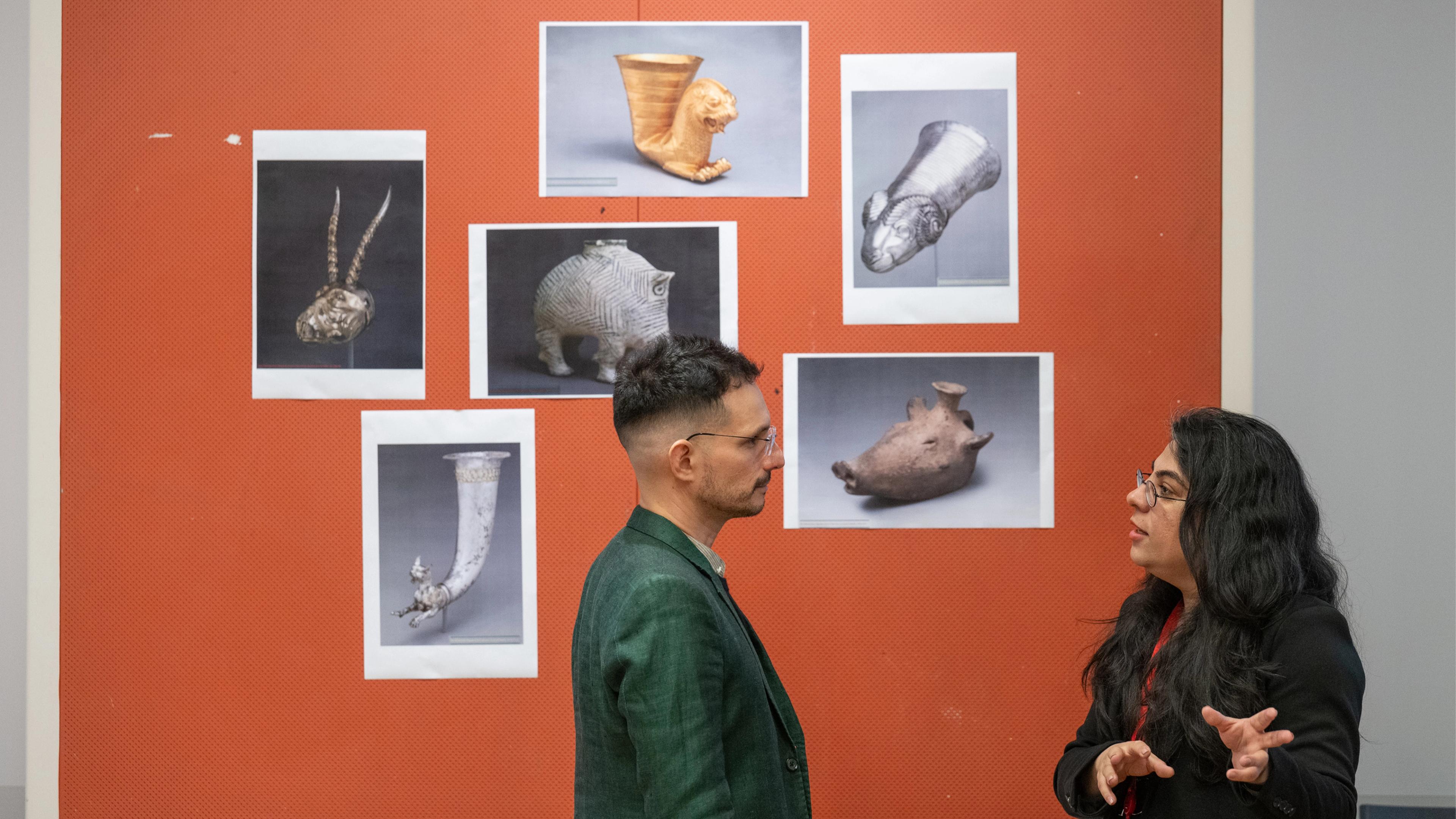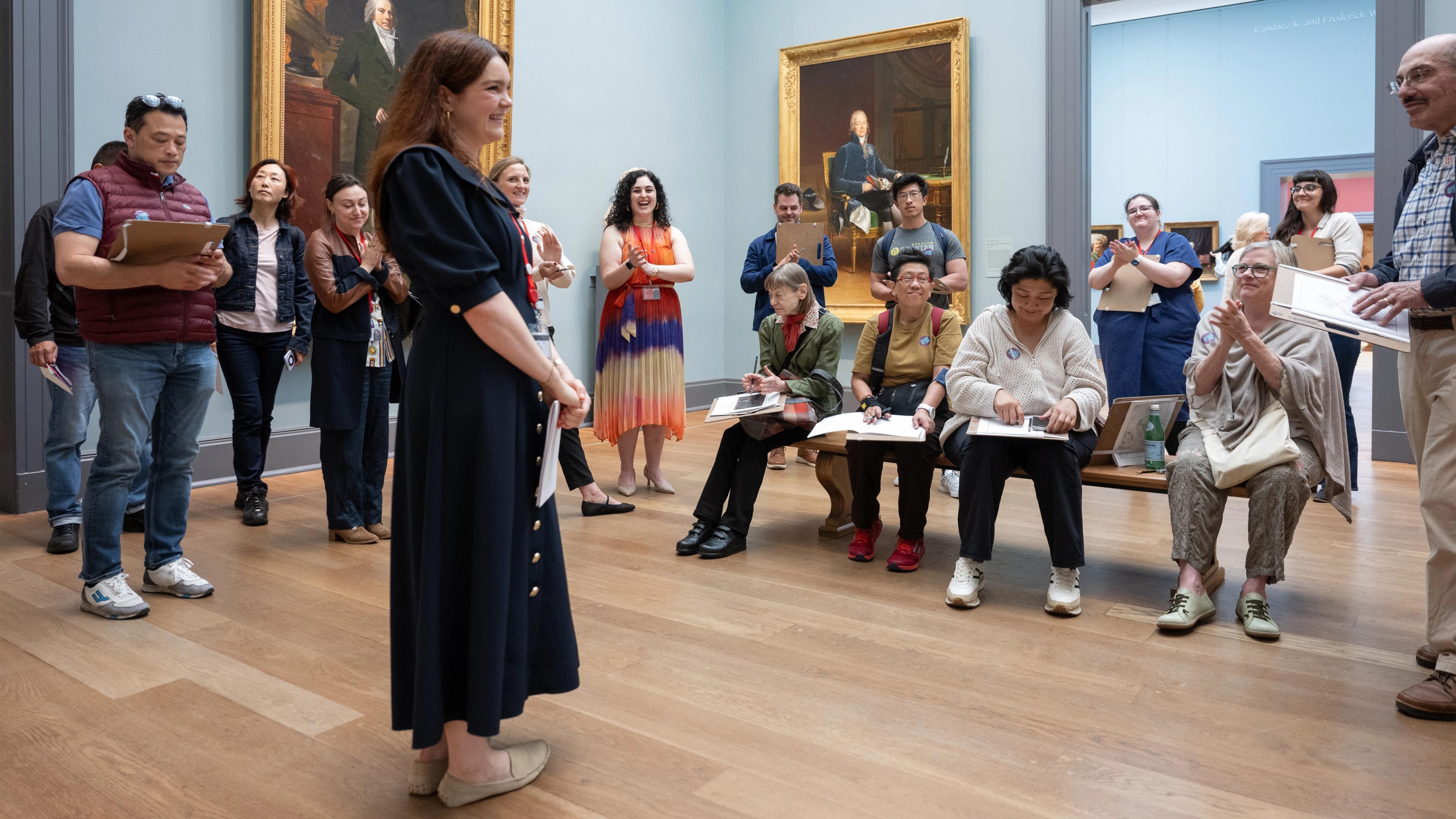The Tiffany & Co. Foundation Internship in American Decorative Arts
About the Internship
The Tiffany & Co. Foundation 12-month internship was established to provide invaluable training for the next generation of museum professionals in the decorative arts. This internship is awarded to an individual with a special interest in American decorative arts. Curators in the American Wing work with the Tiffany & Co. Foundation intern to develop their knowledge and skills through hands-on projects researching and documenting the collection, special exhibitions, and/or additional departmental projects. The Tiffany intern will also pursue an independent research project culminating in a small gallery installation. Read about a former Tiffany & Co. Foundation intern’s project.
Strong candidates are students with a dedicated interest in American culture and American decorative arts, 1700–1930. Strong writing skills, the ability to work independently, and enthusiasm for hands-on experience are encouraged.
Requirements:
- This internship is open to current graduate students who will have completed a master's degree in a field related to American decorative arts by the beginning of the internship program in June, or who have completed a master's degree in a field related to American decorative arts no more than one year prior to the application deadline.
- Current and former interns: If you have been an undergraduate or graduate intern at The Met, you are eligible to apply provided you have not completed more than a one-semester internship (either unpaid or paid). We will give preference to applicants who have not yet participated in the MuSe (Museum Seminar) Internship Program.
- All interns are employed by The Met and must have valid US work authorization. If you are not a US citizen nor a permanent resident with authorization to live and work in the US, please see “International Applicants” below.
- Met interns commit to being fully present and onsite for the duration of the internship. They are not permitted to take courses or hold additional jobs or internships that coincide with their scheduled Met internship work hours.
- Internship dates are fixed and not flexible.
International Applicants:
- Undergraduate and graduate internships at the Museum are open to international applicants. Interns are responsible for ensuring that they have valid legal status under applicable US visa regulations while participating in the Museum's paid internship program. All interns must have valid US work authorization. The Museum does not sponsor visas for interns. If you require a visa, you may be eligible to participate in the Exchange Visitor Program (J-1 visa program) by going through an outside agency that has been authorized by the State Department to sponsor a J-1 trainee visa. These sponsors are responsible for supporting and monitoring foreign nationals during their exchange programs in the United States. Note: The J-1 visa program currently requires that interns work 32 hours per week; for this reason, individuals requiring a J-1 visa should only apply to the full-time MuSe Internship Program, not the part-time internship.
- We recommend that you consult with the US embassy in your home country to determine which visa will allow you to participate in this internship. Please be aware that obtaining a visa is usually a lengthy process and can cost upwards of US$1,500; it must be completed well in advance of the internship start date. If you are offered an internship but do not have work authorization before the start date of the program, your internship will be canceled.
Compensation: $26 per hour
Travel:
- $1,500 toward housing/travel to New York City (less applicable taxes and deductions)
- $3,000 stipend available for research and educational travel
Health Insurance: Long-term interns are eligible to receive benefits currently offered to non-exempt full-time employees of the Museum.
Application deadline: Wednesday, January 14, 2026, 5 pm (ET)
Notification period: by the end of April 2026
Internship period:
- June 2, 2026–May 28, 2027
- Full time: five days, 35 hours per week
Complete the online application. The application will ask you to select the internships that interest you:
- MuSe Program ten-week internship, or
- MuSe Program long-term internship
You may apply for any or all of these internships using the same application.
The application requires:
- Short essay responses (including an essay specific to the long-term internships to which you are applying)
- An unofficial transcript
- A résumé describing any work or extracurricular experiences
- For Design Department candidates, a PDF portfolio or link to an online portfolio
- Two letters of recommendation, one of which must be from a professor or instructor who knows you in an academic context. Please note: your recommendation letters must be submitted by this application deadline.
We will not accept any applications, application materials, or recommendations after the deadline.
What to Expect After Applying
Once the application deadline passes, the first round of review begins. An Internship Review Committee comprised of staff from across the Museum will consider your application for the two Museum areas you’ve selected. Reviewers evaluate applications using the rubric discussed below and recommend the strongest applicants to proceed to a second round of review by the internship supervisors. During this round of review, supervisors evaluate applications using the same rubric, and then select at least four applicants as finalists. These applicants will move to the interview stage. Supervisors will conduct virtual interviews and then recommend one candidate for the internship. Final candidates are sent to the Director’s Office for approval.
Selection Criteria
Please see the Application Evaluation Rubric (PDF) for a detailed description of how your application will be evaluated, as well as an explanation of the selection criteria below.
It’s important to explain what you want to learn from an internship at The Met in your essays. Researching the variety of jobs available in an art museum—and the skills needed to do those jobs—will help you shape and articulate your goals. Once reviewers understand what you’d like to get out of the internship, they can evaluate whether The Met’s program and internship projects can help you meet your goals.
Reviewers look at your past jobs, internships, volunteer work, academic courses, and your personal journeys and consider how this internship could help you grow and/or constitute a turning point in your studies or career. Your application will be stronger if you’re able to demonstrate how the internship could have a strong impact on your growth in one or more areas. This potential impact could be evident in your essays and supported by the experiences on your résumé. For summer applicants, this potential can also be supported by your letters of recommendation.
Reviewers evaluate the level of personal and academic responsibility your application demonstrates. We’re not only considering your grades, but also whether you’ve been consistent and followed through with your commitments to your chosen activities, jobs, or volunteer work. Reviewers want interns who will show up for themselves and their peers and are ready to learn and take advantage of everything this internship experience can offer. We’re looking across all your materials to find a picture of how ready you are to learn and commit to this internship; a few low grades will not knock you out of consideration. For summer applicants, letters of recommendation are also helpful.
Reviewers look at your past exposure to the arts and art museums, and whether you’ve had any experiences like our internship program. If you’ve already had several museum internships, especially at large museums like The Met, reviewers want to know how The Met’s program can offer something new, and how you’d continue to grow from this experience. Students who have had very little or no prior experiences in the arts due to systemic barriers or unequal access to art and culture will be rated higher in this area.
Life as a Met Intern

Seminar Series
Weekly seminars give interns an understanding of the wide range of work that occurs at The Met, and how Museum professionals collaborate to plan and support the daily operations of one of the world's largest museums.

Public Engagement
Full-time interns complete a two-week MuSe training on museum teaching and public speaking, then design tours or programs that reflect their interests—offering visitors relevant, engaging, and accessible insights into art and The Met from an insider's perspective.
Helpful Links for Internship Applicants
Undergraduate and Graduate Internships are made possible by Adrienne Arsht.
Additional support is provided by Jack and Susan Rudin, gifts in honor of Emily K. Rafferty, The Tiffany & Co. Foundation, Judith Lee Stronach and Raymond Lifchez, Marilyn M. Simpson Charitable Trust, Ittleson Foundation, The Thorne Foundation, Mary Jaharis, Nellie and Robert Gipson, The Billy Rose Foundation, Winston Foundation, Anna Sui, The Soloviev Foundation, and The National Endowment for the Humanities: Democracy Demands Wisdom.